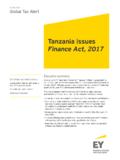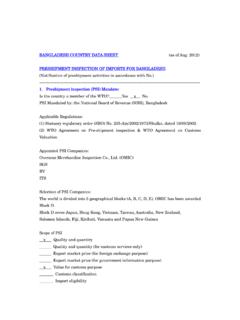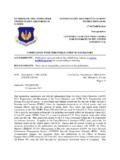Transcription of UNOFFICIAL CONSOLIDATED TEXT - OECD.org
1 UNOFFICIAL CONSOLIDATED TEXT DECISION OF THE COUNCIL C(2001)107/FINAL CONCERNING THE CONTROL OF TRANSBOUNDARY MOVEMENTS OF WASTES DESTINED FOR RECOVERY OPERATIONS, AS AMENDED BY C(2004)20 For reasons of simplicity and convenience, this document consolidates the two following official documents: 1- the text of the original Decision C(2001)107/FINAL, adopted by the OECD Council in 2002, and 2- the text of the amendments made to Appendices 3 and 4 of Decision C(2001)107/FINAL, document C(2004)20 which was submitted to Council for information in March 2004.
2 These amendments, which came into force on 20 November 2003, have been adopted by OECD Member countries in accordance with the provisions of Article 3, Section B, Chapter II of C(2001)107/FINAL, which states that amendments made to the Basel lists of wastes will be incorporated into the OECD lists of wastes if there is no objection. Since no objection has been raised from OECD Member countries about the incorporation of the Basel amendments adopted at the 6th Meeting of the Conference of the Parties, these amendments have been transposed into Appendices 3 and 4 (OECD Green and Amber lists of wastes) of the OECD Decision.
3 2 TABLE OF CONTENTS REVISION OF COUNCIL DECISION C(92)39/FINAL .. 3 CHAPTER I:.. 4 CHAPTER II .. 5 A. DEFINITIONS .. 5 B. GENERAL PROVISIONS .. 6 (1) Conditions .. 6 (2) Control 7 (3) Procedure for Amendments to the Lists of Wastes in Appendices 3 and 4 .. 7 (4) Provision for Specific National 8 (5) Information Requirements .. 8 (6) Wastes not Listed in Appendices 3 or 4 to this 9 (7) Generator of Mixed or Transformed Waste .. 9 (8) Procedures for Mixtures of 9 C. GREEN CONTROL PROCEDURE.
4 10 D. AMBER CONTROL PROCEDURE .. 10 (1) Conditions .. 10 (2) Functioning of the Amber Control Procedure: .. 11 Case 1: Individual transboundary movements of wastes or multiple shipments to a recovery 11 Case 2: Transboundary movements of wastes to pre-consented recovery 13 (3) Duty to Return or Re-export Wastes Subject to the Amber Control Procedure .. 13 (4) Duty to Return Wastes Subject to the Amber Control Procedure from a Country of Transit .. 14 (5) Provisions Relating to Recognised Traders.
5 14 (6) Provisions Relating to Exchange (R12) and Accumulation (R13) 14 APPENDIX 1: CATEGORIES OF WASTES TO BE 16 APPENDIX 2: LIST OF HAZARDOUS CHARACTERISTICS .. 18 APPENDIX 3: LIST OF WASTES SUBJECT TO THE GREEN CONTROL PROCEDURE .. 20 APPENDIX 4: LIST OF WASTES SUBJECT TO THE AMBER CONTROL PROCEDURE .. 22 APPENDIX : DISPOSAL 24 APPENDIX : RECOVERY 25 APPENDIX 6: CRITERIA FOR THE OECD RISK-BASED APPROACH .. 26 APPENDIX 7: PRACTICAL INFORMATION TO BE PROVIDED BY MEMBER 27 APPENDIX 8: NOTIFICATION AND MOVEMENT DOCUMENTS.
6 29 3 REVISION OF COUNCIL DECISION C(92)39/FINAL ON THE CONTROL OF TRANSBOUNDARY MOVEMENTS OF WASTES DESTINED FOR RECOVERY OPERATIONS THE COUNCIL, 1. Having regard to Article 5a) of the Convention on the Organisation for Economic Co-operation and Development of 14 December 1960; 2. Having regard to the Decision of the Council of 30 March 1992 concerning the control of transfrontier movements of wastes destined for recovery operations C(92)39/FINAL, as amended, which establishes an operational control system for transboundary movements of wastes destined for recovery operations; 3.
7 Having regard to the Basel Convention on the Control of Transboundary Movements of Hazardous Wastes and their Disposal, which entered into force on 5 May 1992, as amended on 6 November 1998 with Annexes VIII and IX listing respectively wastes characterised as hazardous pursuant to Article 1(1)(a) of the Convention and wastes not covered by Article 1(1)(a) of the Convention; 4. Noting that most OECD Member countries (hereafter Member countries) and the European Community have become Parties to the Basel Convention; 5.
8 Noting that Member countries agreed at the Working Group on Waste Management Policy (WGWMP) meeting in Vienna in October 1998 to further harmonisation of procedures and requirements of OECD Decision C(92)39/FINAL with those of the Basel Convention; 6. Noting that recovery of valuable materials and energy from wastes is an integral part of the international economic system and that well established international markets exist for the collection and processing of such materials within Member countries; 7.
9 Noting further that many industrial sectors in Member countries have already implemented waste recovery techniques in an environmentally sound and economically efficient manner, thus increasing resource efficiency and contributing to sustainable development, and convinced that further efforts to promote and facilitate waste recovery are necessary and should be encouraged; 8. Recognising that the environmentally sound and economically efficient recovery of wastes may justify transboundary movements of wastes between Member countries; 9.
10 Recognising that the operational Control System established by Decision C(92)39/FINAL has provided a valuable framework for Member countries to control transboundary movements of wastes destined for recovery operations in an environmentally sound and economically efficient manner; 10. Desiring, therefore, to continue this agreement or arrangement under Article of the Basel Convention; 411. Recognising that Member countries may, within their jurisdiction, impose requirements consistent with this Decision and in accordance with the rules of international law, in order to better protect human health and the environment; and 12.














